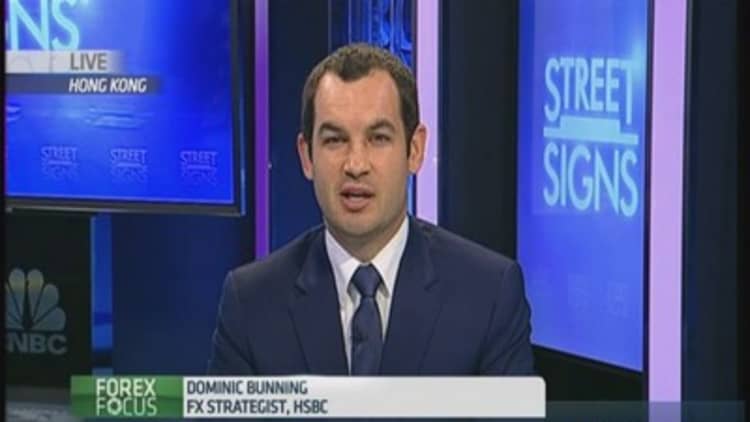Asian equity markets traded mostly higher on Friday, cutting the week's losses, as a positive lead from Wall Street overnight offset concerns about a further decline in oil prices. However, gains were trimmed following the release of soft economic data from the mainland.
China's industrial production rose 7.2 percent on year in November, below expectations for a 7.5 percent increase in a Reuters poll and down from October's 7.7 percent rise. Meanwhile, retail sales rose 11.7 percent on year, above expectations for an 11.5 percent rise. Fixed asset investment for the January-November period increased 15.8 percent, in line with expectations.
Read MoreWinners & losers: Oil's effect around the globe
Wall Street overnight
U.S. stocks advanced on Thursday, cutting weekly losses, but euphoria over increased retail sales in November faded after crude dropped below $60 a barrel. The pullback escalated amid efforts to block a spending bill in the House, sparking worries of a government shutdown.
Halting a three-session losing streak, the Dow Jones Industrial Average ended up 0.4 percent, while the S&P 500 added 0.5 percent. The tech-heavy Nasdaq Composite gained 0.5 percent.
Oil prices remain in focus after U.S. crude fell below $60 a barrel on Thursday, the first time in five years that it breached the psychologically-important support level, as oil markets extended this week's losses on oversupply concerns.
Mainland shares flat
China's benchmark Shanghai Composite index closed up 0.5 percent, rallying in the last hour of trade as a set of below-view data fanned expectations for more stimulus.
"Everybody in China now see stimulus coming, monetary easing, more interest rate cuts and more targeted fiscal measures. [Since] it's a policy market and that's what Chinese investors are seeing, it's driving markets up," Donald Straszheim, Senior Managing Director, China Research at ISI Group, told CNBC.
Lenders traded flat-to-lower following a Reuters reports that Beijing urged mainland banks to step up on lending in the final months of 2014 and relaxed enforcement of loan-to-deposit ratios to expand credit. Merchants Bank and Minsheng Bank dropped more than 2 percent each
In Hong Kong, the key Hang Seng index traded modestly higher on Friday. Outperforming the bourse was Coach which rose to its best levels in 4 months on reports that French luxury retailer LVMH may be interested in the handbag maker.

Tokyo rises 0.7%
Japanese shares snapped a three-day losing streak on Friday, on the back of a weaker yen and comforting signs of resiliency in the U.S. economy, but gains were trimmed following the release of softer-than-expected economic data from the mainland. The benchmark Nikkei 225 receded 3.1 percent for the week.
The market was also supported by expectations that Prime Minister Shinzo Abe is on track for a landslide win on Sunday's parliamentary election. Polls showed the LDP-Komeito coalition would retain a two-third majority in parliament, giving Abe the mandate he needs to continue his policies.
Index heavyweights lifted the bourse; Fast Retailing and robot maker Fanuc advanced 2.1 and 0.7 percent, respectively.
Read MoreTokyo's poor: Abe will win, what choice do we have?
Exporter stocks mostly benefited from a weak yen boost. Panasonic rallied nearly 1 percent while Canon rocketed 3.9 percent after an upward revision to its year-end dividend forecast.
However, Nissan and Honda Motor underperformed, dragged down by Thursday's announcements for wider recalls over Takata air bag issues.

Sydney falls 0.2%
Australia's benchmark S&P ASX 200 closed the week lower, falling for the fourth straight session, as miners dwindled after iron ore prices fell to its weakest level in more than 5 years.
Iron ore producers Fortescue Metals and Rio Tinto plunged more than 2 percent each. Lenders were also battered; Australia and New Zealand Banking Group and Commonwealth Bank of Australia retreated 0.7 and 0.5 percent, respectively.
Leighton Holdings erased early gains to ease 0.7 percent after news that China Communications Construction has agreed to buy a building unit of the project development and contracting group for $951 million.
Drilling equipment and services supplier Boart Longyear closed down 5.4 percent despite announcing that 2014 revenue could be at the stronger end of the range of analyst estimates.
Meanwhile, the Australian dollar traded at $0.8271 against the U.S. dollar - near levels unseen since 30 June 2010 - after Reserve Bank of Australia governor Glenn Stevens said in an interview that the currency remains overvalued and it is "most appropriate" at 75 U.S. cents, on Thursday.
Read MoreDid RBA's Stevens break the central banker code?
Seoul up 0.3%
South Korea's Kospi index finished higher on the last trading session of the week, recovering from Thursday's five-week low.
LG Display outperformed with a 4 percent gain while Kia Motors added nearly 3 percent.

